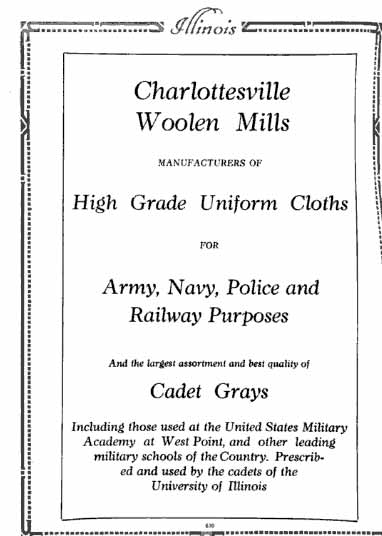the golden fleece

from the 1915 Illio
Annual Report of the Commissioner and the Board of Agriculture and Immigration
By Dept. of Agriculture and Immigration, Virginia
CHARLOTTESVILLE, VA., November 2, 1891
H. L. Lyman, Esq
DEAR SIR--In compliance with my recent promise to give you such data as I could, in furtherance of your desire to increase the interest of our farmers in sheep-raising, I herewith hand an itemized list of purchases made by us in Harrison county, Ohio, in the months of July and August of this year, and I may add that our buyer starts for the same section this week, expecting to invest $8,000 to $10,000.
Our total purchases of wool for the year 1890 were a little in excess of $110,000. After first of January next I can give you the figures for 1891 if desired.
It would seem to be most fortunate for the farmers of Virginia, and especially for those in close proximity to our mills, to have a woolen manufacturing plant located in their midst, which offers a home market for the staple, where they can sell direct to the manufacturer, and without the intervention of middle men. Our purchases of Virginia wools, however, are necessarily limited, by reason of the fact that we must buy the raw material of such quality as is adapted to making the kind of goods our trade demands, which is largely three-quarter to full-blood Merino. Just here I am aware that I antagonize a well-grounded idea that by reason of our close proximity to the large mutton-consuming markets of the seaboard the profit of sheep-raising is strongly in favor of the longer wool breeds, and it is difficult to argue against well settled prejudices, but they should always yield to reason and facts.
In those sections of our country, and I may say of the world, where sheep-raising has been most profitable, careful investigation will show that the Merino predominates. No State excels our own in climatic and other advantages for profitably growing " the golden fleece," the cur dog being practically its only enemy. To combat this enemy successfully, we must either have a dog tax thoroughly enforced, which for the eastern portion of the State seems to be in the remote future, or flocks must be of sufficient size to justify the employment of a regular shepherd. No breed will stand herding in large flocks without falling a prey to disease except the Merinos.
The prejudice to which I have referred as existing against this breed dates back, I think, to a long ago period, and a visit to Washington and other counties in Southwestern Pennsylvania and Harrison, Carroll, Belmont and other counties of Southeastern Ohio would be a revelation to those entertaining these prejudices, both as to their value for mutton and wool. By judicious breeding and culling the standard of the full-blooded Merino has been wonderfully improved both as to size of the animal and its desirability for table mutton, as well as length of staple and weight of fleece, until it now rivals the Shropshires and their most worthy progenitors, the Southdowns, while for an all-around, general-purpose sheep, either in large or small flocks, no breed is so highly prized in the localities referred to as the " Delaine " family, which is the outcome of a careful cross of the Merinos upon the long-wool breeds upon the principle of the survival of the fittest.
The "Delaines" vary according to the care in culling and tastes of the breeder, from one-half to three-fourths Merino, having the characteristics of reasonably early maturing mutton, of beautifully marbled flesh, fine size and a fleece of fine, strong, long-stapled wool, so thickly studded on the pelt as to yield easily an average of eight to twelve pounds of the most desirable and highest priced wool on the market.
If our farmers could be induced to try this Merino cross and exercise the necessary care in culling their flocks, I have no doubt they would be found to be quite as desirable for mutton as the breeds now most popular, and our mills would offer them a home market for all the wool they could grow.
Most truly yours,
H. C. MARCHANT.
(the above courtesy of Google Books)
(Cinder Stanton speaks about Jefferson's sheep)
Labels: wool

0 Comments:
Post a Comment
<< Home